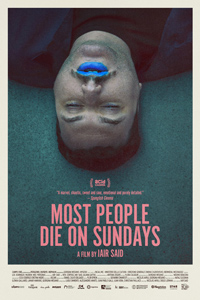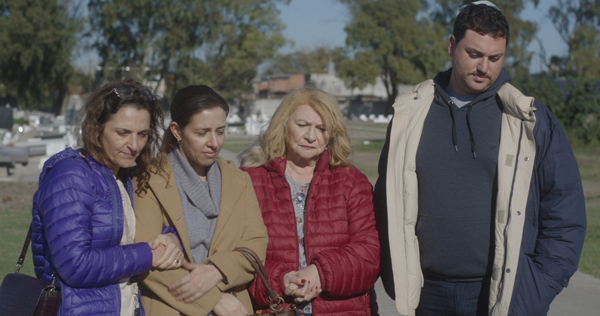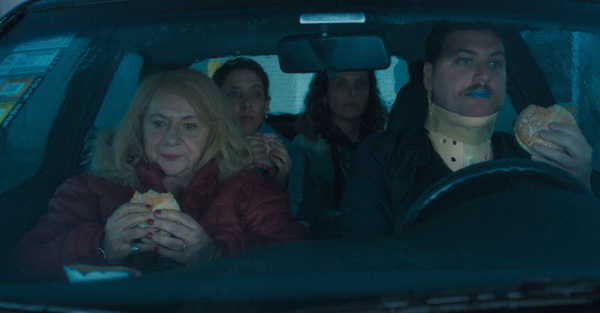A Month of Sundays: Said Squeezes Magic Out of Melancholy
 The tagline for Iair Said’s sophomore film More People Die on Sundays (Los domingos mueren más personas) could very well be “Death Be Not Loud,” as it examines a somewhat hapless thirtysomething, played by the director himself, who returns home for a funeral and experiences something resembling an epiphany regarding his own search for fulfillment. Like Said’s previous directorial effort, the 2019 documentary Flora’s Life is No Picnic, death is the transitional phase acting as dramatic catalyst, used as an impetus for the living to grasp for meaning in either an existential or economic sense.
The tagline for Iair Said’s sophomore film More People Die on Sundays (Los domingos mueren más personas) could very well be “Death Be Not Loud,” as it examines a somewhat hapless thirtysomething, played by the director himself, who returns home for a funeral and experiences something resembling an epiphany regarding his own search for fulfillment. Like Said’s previous directorial effort, the 2019 documentary Flora’s Life is No Picnic, death is the transitional phase acting as dramatic catalyst, used as an impetus for the living to grasp for meaning in either an existential or economic sense.
While the mechanics of Said’s narrative are arguably familiar, it’s an interesting dissection of identities involving a gay, overweight, Jewish Argentinean of a particular age whose experiences growing up in a certain time and place have paralyzed him in a repetitive rhythm of arrested development. Exhibiting questionable behaviors, often which are self-sabotaging and prohibitive to his well being, Said brings this somewhat mournful portrait to a quietly moving grace note suggesting the silver lining of loss is a motivational reminder to the living.
As David, Said seems intent on showcasing the worst possible tendencies of a character who appears to be content with being perpetually misunderstood, if not inherently unlikeable. We meet him during a tornado of emotional turmoil, begging forgiveness from a presumed romantic partner who is offscreen showering in a hotel room. David’s extreme distress is unnerving, and, as we come to find, seems to be a regular, even normalized pattern of behavior. His dysfunction continues on his flight back home to Argentina, a fear of flying necessitating sleeping pills which he takes too soon for the ultimately delayed flight. It would appear he’s developed a need for the world to bend to his needs, which is, of course, a continual recipe for disaster, doomed forever to navigate environments where nothing ever seems to be going the right way.

Returning for the funeral of his uncle (the father of a minor relative played by noted Chilean actor Antonia Zegers), it would appear this is merely the prologue for the imminent death of his own father, currently hooked up to a ventilator his mother Dora (Rita Cortese) has decided to unplug. David seems intent on avoiding visiting his comatose father in the hospital, focusing instead on his own desires, which includes taking his driver’s license test while visiting home. He appears to have an affable connection with his sister and mother, though there’s a clear sense of their avoiding David’s sexual orientation, which has allowed for his secretive, often predatory behavior when it comes to men. While it’s not an inherently toxic familial climate, there’s a touch of Torch Song Trilogy (1988) evident in the relationship issues between mother and son. “If you want to be a Jew, you must know how to suffer,” she tells an orderly at the hospital, which may as well be her mantra based on how she’s decided to bear her grievances to date.

Within the confines of its slim running time, we’re mostly treated to David instigating a variety of agonizing moments, mostly where he’s surreptitiously hitting on men, which highlight’s Said’s talents for dark comic criticism. He receives a slap from his driving instructor whilst trying to sneak a kiss, but a more potent moment arrives when, locked out of his mother’s apartment in his underwear, he accosts a neighbor for a phone and a pair of shorts which he uses to sniff and masturbate to in the man’s bathroom. David’s look and demeanor recalls the visage of Harris Milstead (when he wasn’t being Divine), and there’s a sense his unchecked undesirable behavior may be at the root of his romantic predicament(s). In short, he’s someone who has never tapped into his talents nor stumbled into a tribe of misfits who would help accentuate his talents. Mumblings about a Masters course in Communications in Spain seem to be the remnants of a dead dream he abandoned long ago, yet remains the rote narrative he must use to explain his continued absence from his family.
Ultimately, he ingratiates himself upon a younger gay man at a family gathering to attend a party where he must wear blue lipstick to gain entrance. Once again, he’s a stranger in a strange land, but what Said lands perfectly in the subtext is the notion of how David likely wasn’t allowed access to these formative spaces and events when they would have been appropriate for him. As would be expected from the narrative cues, a visit to his father and a subtle but emotionally effective moment with his mother tie everything together in a loving and lovely fashion. In this world, for these people, death ends up feeling like its own significant Sunday kind of love.
Reviewed on May 18th at the 2024 Cannes Film Festival – ACID section. 75 Mins
★★★/☆☆☆☆☆


